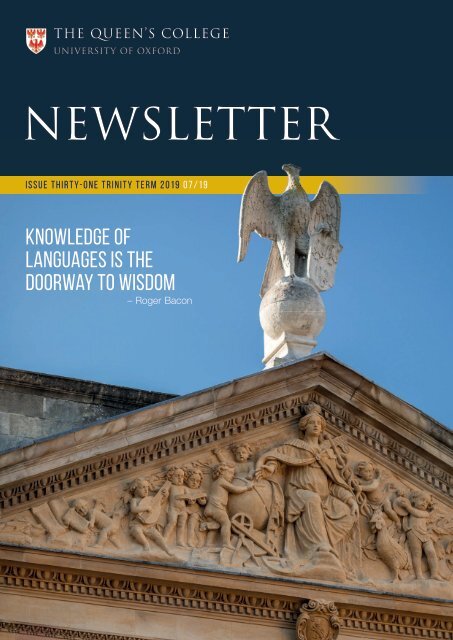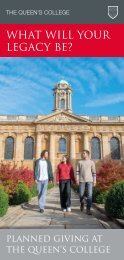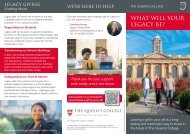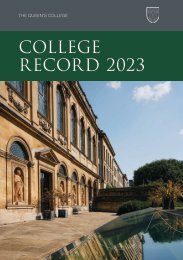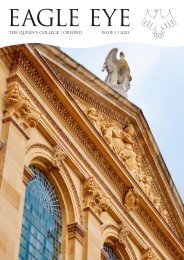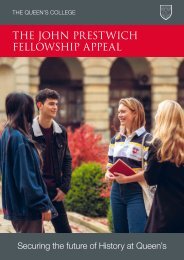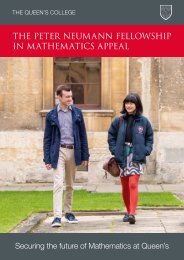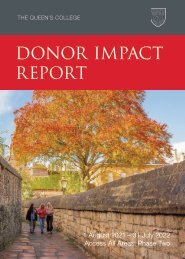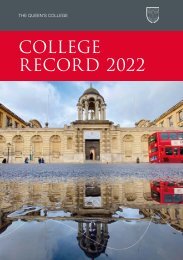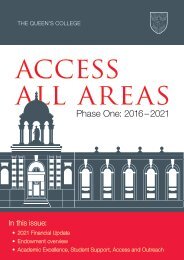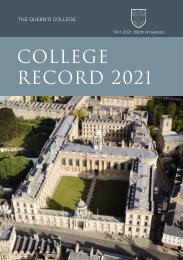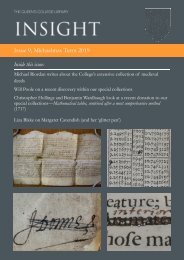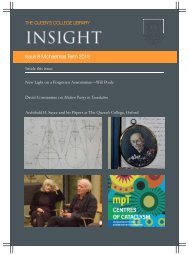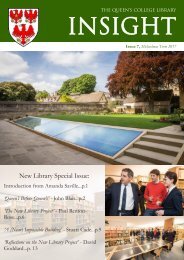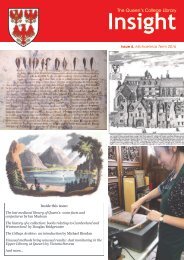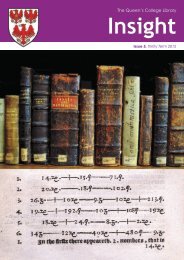The Queen's College Newsletter: Trinity Term 2019
As well as the usual College news, this edition focuses on the different work being undertaken at the College to explore the importance of languages: from bringing creative translation to classrooms in Oxfordshire, to examining ancient texts and gleaning new knowledge about past cultures. This Newsletter also includes the final letter from Provost Professor Paul Madden before his retirement.
As well as the usual College news, this edition focuses on the different work being undertaken at the College to explore the importance of languages: from bringing creative translation to classrooms in Oxfordshire, to examining ancient texts and gleaning new knowledge about past cultures. This Newsletter also includes the final letter from Provost Professor Paul Madden before his retirement.
- No tags were found...
Create successful ePaper yourself
Turn your PDF publications into a flip-book with our unique Google optimized e-Paper software.
<strong>Newsletter</strong><br />
Issue thirty-one trinity <strong>Term</strong> <strong>2019</strong> 07/19<br />
knowledge of<br />
languages is the<br />
doorway to wisdom<br />
– Roger Bacon
THE QUEEN’S COLLEGE<br />
www.queens.ox.ac.uk<br />
Contents<br />
pages 2-3<br />
Letter from the provost<br />
Page 4<br />
News from our students<br />
Page 5<br />
News from old members<br />
Pages 6–8<br />
News from the <strong>College</strong><br />
page 9<br />
Clean-up success<br />
page 10 <strong>The</strong> centre for manuscript and text cultures<br />
Page 11<br />
A glimpse of ancient egypt<br />
pages 12–13 <strong>The</strong> chapel at 300<br />
pages 14–15 <strong>The</strong> Queen’s <strong>College</strong> Translation Exchange<br />
back cover<br />
calendar<br />
Cover photograph © David Fisher<br />
letter from the Provost<br />
I have been asked repeatedly about the well-publicised<br />
initiatives to increase the number of applicants from<br />
disadvantaged backgrounds who are admitted to Oxford.<br />
Does this mean that Oxford is compromising on its mission to<br />
admit only on academic grounds, or making contextual offers<br />
based on perceived disadvantage? Disadvantage is, as we<br />
shall see, multifaceted but if as a crude starting point we take<br />
the state/privately educated measure then in October, if all<br />
holding offers get through the A-level conditions, 64.5% of the<br />
UK students admitted will come from state schools. Or 35.5%<br />
from private ones, which may be compared with the 18% of<br />
sixth-form students who are in private schools – a significant<br />
“overweight” but by no means as “bad” as in much of the public<br />
perception. Disadvantage is more complex than is captured<br />
by the simple state/private measure, however. We know, for<br />
example, that a large proportion of the Oxford students who<br />
would be entitled to free school meals on the basis of their<br />
family income (surprisingly, about 9% of the total) were privately<br />
educated – presumably because their promise was recognised<br />
early and they were given scholarships. <strong>The</strong> information we have<br />
about applicants is their home postcode, taken as an indicator<br />
of family means, and the history of their schools in progressing<br />
candidates to higher education. Again, these provide imperfect<br />
measures of disadvantage (called POLAR and ACORN) but they<br />
are all we have to work with at the time of application.<br />
<strong>The</strong> reason that the introduction of the initiatives has been<br />
welcomed within Oxford is not because of a desire to match<br />
the socioeconomic profile of the country per se or, indeed,<br />
to respond slavishly to the media and government pressure<br />
to achieve that objective, though it is certainly true that such<br />
pressure is being exerted through the Office for Students and<br />
will require a response. Rather, it is the desire to be admitting<br />
the most talented and promising students who, by the end of<br />
the course, will have achieved most. In other words, we have<br />
become sensitised to the observation that our admissions<br />
PAGE 12<br />
process is biased towards achievement and preparedness at<br />
17 and 18, rather than towards the capacity to achieve highly<br />
at 21. Careful studies and tracking of all applicants have shown<br />
that a very substantial number of rejected applicants who are<br />
disadvantaged, at least according to the POLAR and ACORN<br />
measures, go on to achieve A-level results which easily meet<br />
the standard tariffs for the courses for which they have applied.<br />
This, in itself, does not mean that they have the capacity to<br />
achieve highly, but it suggests that closer attention should be<br />
paid to them as they pass through the admissions process.<br />
One of the initiatives is a response to this observation.<br />
Disadvantaged students applying through UCAS are “flagged”<br />
but pass through the admissions process in the normal<br />
way. Each college will reserve a number of places for such<br />
candidates who narrowly miss out on being offered a place.<br />
<strong>The</strong>y are made the same A-level offer as all the other candidates<br />
applying for that course and agree to participate in a “bridging”<br />
programme if they make the offer. This is a short residential<br />
programme, between A-level results and the start of the<br />
academic year, designed to facilitate the transition to their<br />
course and Oxford. At Queen’s, we have always had a number<br />
of places not allocated to particular subjects, and we will be<br />
reserving two such places this year for the candidates identified<br />
as above. This number is envisaged as doubling over the<br />
subsequent four years, and for the University as a whole to see<br />
about 200 students (out of 3,400) come to Oxford via this route<br />
by 2023.<br />
<strong>The</strong> second initiative is to present highly disadvantaged<br />
candidates, for example those who have been in care or<br />
come from a remote community with poor schooling, with<br />
the opportunity to make an application during a residential<br />
foundation year in Oxford. <strong>The</strong>se candidates will have been<br />
identified as highly promising by teachers, but would be highly<br />
unlikely to make a successful application through normal<br />
channels because of their educational disadvantage. Because<br />
the initial application will not be made through UCAS, it will<br />
be possible to ask for some hard information about their<br />
circumstances. It is envisaged that about 30 students<br />
each year will come through this route by 2023. Queen’s<br />
will not be participating in this programme initially,<br />
as we do not have the space or the resources to<br />
deal with the foundation year. However, we will be<br />
providing a substantial part of the funding for it,<br />
and for the bridging scheme, through a system<br />
of University taxation to which we make a large<br />
contribution.<br />
As I dare say you are aware, this will be my last<br />
<strong>Newsletter</strong> before heading off into retirement.<br />
I feel that I am leaving the <strong>College</strong> in good<br />
shape, with the commitment to the tutorial<br />
system and the presentation of opportunities<br />
for further development to all students firmly<br />
in place. <strong>The</strong> traditional strong sense of a<br />
community extends throughout the <strong>College</strong> and<br />
has come to embrace a large pool of Old Members,<br />
who have been very generous and engaged. A lot<br />
of high-quality building work has been done, but<br />
I will also be bequeathing a number of projects to<br />
my successor who, I am sure, will receive the same<br />
level of support. I have enjoyed my eleven years “in<br />
charge” enormously and they have been the highlight<br />
of my career. I am very grateful to the large number of<br />
people who have helped me – Fellows, Staff, students,<br />
but particularly to Alison who has always been there.<br />
2<br />
3
THE QUEEN’S COLLEGE<br />
www.queens.ox.ac.uk<br />
News from our students<br />
News from Old Members<br />
New Choir CD<br />
Fellow in Music and Organist Professor<br />
Owen Rees leads early-music consort<br />
Contrapunctus alongside the Choir<br />
in performances of John Taverner’s<br />
masterwork, the Missa Gloria tibi trinitas.<br />
A virtuosic work, it has pride of place in the Forrest-Heyther<br />
partbooks (in the Bodleian Library), and might well have been<br />
heard on <strong>Trinity</strong> Sunday in the chapel of Cardinal Thomas<br />
Wolsey’s palace at Hampton Court.<br />
Classical Source said: ‘Particularly impressive is the integration<br />
of a warmly blended Queen’s <strong>College</strong> tone with the brightly<br />
focused voices of Contrapunctus. <strong>The</strong> students sound every<br />
bit as accomplished as their professional counterparts and<br />
the sopranos are having the time of their lives in the rousing<br />
final sections of the ‘Gloria’ and the ‘Credo’ where Taverner’s<br />
contrapuntal skill is at its most thrilling.’<br />
<strong>The</strong> CD is available here: http://hyperurl.co/GloriaTibiTrinitas.<br />
Teacher wins award after being<br />
nominated by Queen’s student<br />
Callum Wardle, a first-year student at Queen’s, nominated<br />
his school teacher, Robert Fisher of Blackpool Sixth-Form,<br />
for an Oxford University Inspirational Teachers Award.<br />
Robert is one of 10 winners who received an award this<br />
year.<br />
<strong>The</strong> Inspirational Teachers Awards are a way of recognising<br />
the importance of school or college teachers in encouraging<br />
talented students to realise their potential and make a<br />
successful application to Oxford. Each year current first-year<br />
Oxford undergraduates from UK state schools or colleges<br />
with a limited history of sending students to Oxford are<br />
asked if they would like to nominate an inspirational teacher.<br />
As part of his nomination Callum wrote:<br />
‘Rob is really the driving force behind<br />
my application to Oxford. If it<br />
weren’t for him, I would never have<br />
realised I had what it takes to<br />
achieve as highly as I have<br />
and wouldn’t have pushed<br />
myself to do so.’<br />
<strong>The</strong> Spectacle of Illusion<br />
Old Member Dr Matthew Tompkins<br />
(Psychology, 2011) is a professional<br />
magician-turned-psychologist. His new<br />
book <strong>The</strong> Spectacle of Illusion (Thames &<br />
Hudson) has been published in partnership<br />
with the Wellcome Trust. Its release<br />
coincides with the Wellcome Collection’s<br />
free exhibition ‘Smoke and Mirrors’.<br />
<strong>The</strong> Spectacle of Illusion is written for<br />
general audiences on the topic of historical and contemporary<br />
relationships between magicians, scientists, and fraudulent<br />
mystics. It features stories of ghost-rapping, mind-reading,<br />
lethal autopsies, full-body-cavity ghost hunts, death-defying<br />
stunts, and death … obeying (?) stunts (that is to say, stunts<br />
where the performers accidentally died). This is a selectively<br />
honest account of lies about the truth about lies, with lots of<br />
weird pictures.<br />
In 2016 Matthew led a study that examined the psychology of<br />
magic: could magicians’ misdirection techniques be used to<br />
make us ‘see’ something that was never there? Read more here:<br />
www.ox.ac.uk/news/2016-08-09-psychologists-magic-makesnon-existent-object-disappear.<br />
Lifetime achievement award<br />
Professor Victor Hoffbrand (Medicine, 1953) has received<br />
the Wallace H. Coulter Award for Lifetime Achievement in<br />
Hematology from the American<br />
Society of Hematology.<br />
Professor Hoffbrand, who<br />
receives the award for his<br />
significant contributions to<br />
haematology in research, patient<br />
care, and education throughout<br />
his 55-year career, said:<br />
‘I am extremely honoured<br />
to receive the Wallace H. Coulter Award for Lifetime<br />
Achievement in Hematology, and I am humbled when I<br />
see the list of the distinguished previous award-winners.<br />
I am particularly delighted to receive an award named<br />
after Wallace Coulter, since it was the ability to count<br />
blood cells that first attracted me to haematology as a<br />
scientific discipline.’<br />
Current student elected President<br />
of the Oxford Student Union<br />
Anisha Faruk (History, 2016) has been elected as President<br />
of Oxford University’s Student Union (OUSU). She has<br />
previously served as the co-chair of the Oxford University<br />
Labour Club and has been the editor-in-chief of the<br />
University’s student newspaper <strong>The</strong> Oxford Student.<br />
Anisha said: ‘It’s an honour to have been elected to<br />
President of the Student Union. <strong>The</strong> support I’ve received<br />
from Queen’s students has been amazing. I’m especially<br />
grateful to the current and former members of the JCR<br />
committee that gave me advice and helped to inform my<br />
manifesto. I’m really looking forward to implementing my<br />
policies and providing a voice for the student body.’<br />
Established in 1961 as the Oxford University Student<br />
Representative Council, OUSU aims to facilitate<br />
communication between students and University<br />
officials, as well as between students, local councils,<br />
and the government.<br />
More information about<br />
this year’s winning<br />
teachers and their<br />
students is available<br />
at www.ox.ac.uk/<br />
inspirationalteachers.<br />
Photo © Edmund Blok<br />
Medical School<br />
prize for medic’s<br />
outstanding<br />
progress<br />
Clinical Medical student<br />
Isabella Watts has been<br />
awarded a Hobson Mann Lovel<br />
Scholarship for outstanding<br />
progress on the clinical medical<br />
(Second BM) course.<br />
Izzy said: ‘I feel very lucky to have been supported so well by<br />
my <strong>College</strong> tutors throughout my degree. <strong>The</strong>y have helped<br />
me hugely with both the bedside and bookwork aspects of my<br />
medical course, both of which are recognised in this prize.’<br />
Hall of Fame<br />
Claire Taylor (Mathematics,<br />
1994) has been inducted<br />
into the International Cricket<br />
Council (ICC) Hall of Fame. She<br />
is the seventh woman overall<br />
and the third female player<br />
from England to be named in<br />
the list.<br />
She said: ‘It’s a great honour<br />
to be inducted into the ICC<br />
Hall of Fame alongside some<br />
of the greatest names of the<br />
men’s and women’s game from<br />
across the world and throughout the generations - players who I<br />
looked up to during my playing career and hold in great esteem.’<br />
Taylor, who scored 1,030 runs in 15 Tests, 4,101 runs in 126<br />
ODIs and 615 runs in 21 T20Is, was named the ICC Women’s<br />
Cricketer of the Year in 2009. She was named the player of the<br />
tournament in the ICC Women’s World Cup 2009 and in the ICC<br />
Women’s World Twenty20 2009. She ended her career with an<br />
average of more than 40 in both Tests and ODIs. She is featured<br />
in the <strong>College</strong>’s Shining a Light exhibition.<br />
Photo © John Pheasant<br />
High point for Old Member<br />
At 4.25 am on the morning of 18 May 2018 Fergus<br />
McDonald (Mathematics, 1983) summited Mount Everest<br />
(8,848 m) from the Nepalese side. He was accompanied by<br />
climbing sherpa Shebbi. <strong>The</strong>y were fortunate to be alone at<br />
the top for 45 minutes, save for two climbers who arrived<br />
from the Chinese side of the mountain, which gave them<br />
a remarkable opportunity to enjoy the extraordinary view<br />
before beginning their descent.<br />
Fergus said: ‘This was both literally and figuratively the<br />
high point after many years of climbing mountains. It was<br />
certainly challenging but the experience of climbing on and<br />
around the mountain for a month before finally reaching the<br />
top was incredible and unforgettable.’<br />
4 5
THE QUEEN’S COLLEGE<br />
www.queens.ox.ac.uk<br />
Photo © John Pheasant<br />
News from the college<br />
Jane Langdale elected foreign associate of the National Academy of Sciences<br />
Professor Jane Langdale CBE FRS has been elected as a foreign associate of the<br />
National Academy of Sciences. <strong>The</strong> National Academy of Sciences (NAS) is a private,<br />
non-profit society of distinguished scholars based in Washington, DC. Established by<br />
an Act of Congress, signed by President Abraham Lincoln in 1863, the NAS is charged<br />
with providing independent, objective advice to the United States on matters related<br />
to science and technology. Scientists are elected by their peers to membership in the<br />
NAS for outstanding contributions to research.<br />
Shining a Light: a photographic exhibition in the cloisters<br />
<strong>2019</strong> marks the 40th anniversary of the admission<br />
of women by the <strong>College</strong>. A temporary exhibition in<br />
the cloisters celebrated this milestone by featuring<br />
women who have contributed to the <strong>College</strong><br />
in various ways over the past four decades.<br />
It included current and former academics, staff,<br />
Old Members, and current students, each with<br />
a one-word description chosen by the subject.<br />
Every individual included was nominated by others<br />
to appear in the exhibition.<br />
John Pheasant (Modern Languages, 1972) made<br />
the exhibition possible by offering to take the<br />
series of photographs. John first pursued a career<br />
in European Community law while developing<br />
his interest in photography, and he turned semiprofessional<br />
a few years ago.<br />
<strong>The</strong> exhibition has now been relocated to several<br />
staircases in Front Quad.<br />
Photo © David Fisher<br />
LISTEN UP!<br />
<strong>The</strong> 2018 Harmsworth Lecture<br />
is now available as a podcast.<br />
War, Race and Anti-Imperialism in<br />
Merze Tate’s International Thought<br />
by Professor Barbara Savage<br />
(Pennsylvania) is available here:<br />
http://podcasts.ox.ac.uk/series/<br />
harmsworth-lecture-series.<br />
<strong>The</strong> <strong>College</strong> has also launched a new<br />
podcast series called LIBcast, which<br />
takes a closer look at the Library’s<br />
impressive collection through its<br />
eclectic exhibitions. Each episode<br />
features the recording of a talk<br />
associated with the Library’s latest<br />
exhibition: http://podcasts.ox.ac.uk/<br />
series/libcast-queens-college.<br />
Professor Langdale is one of 25 foreign associates to be elected this year, bringing the<br />
total number of foreign associates to 487.<br />
She is featured in the <strong>College</strong>’s Shining a Light exhibition and you can read more about<br />
her work on pages 90-91 of the 2018 <strong>College</strong> Record.<br />
JUNIOR RESEARCH FELLOW WRITES PLAY ON THE LAST<br />
GREAT KING OF ASSYRIA<br />
Warrior. Scholar. Empire-builder. King-slayer. Lion-hunter. Librarian.<br />
King Ashurbanipal of Assyria (r. 669–<br />
c. 631 BC) was the most powerful man on<br />
Earth. He described himself in inscriptions<br />
as ‘king of the world’, and his reign from<br />
the city of Nineveh (now in northern Iraq)<br />
marked the high point of the Assyrian<br />
empire, which stretched from the shores<br />
of the eastern Mediterranean to the<br />
mountains of western Iran.<br />
Junior Research Fellow in<br />
Manuscripts and Text Cultures<br />
Dr Selena Wisnom has written a series<br />
of innovative new immersive theatre pieces set in ancient Assyria, one of which<br />
is about King Ashurbanipal, who is also currently the subject of a major British<br />
Museum exhibition.<br />
Reviews of a recent production commended this ‘beautifully crafted work’ that is<br />
‘as atmospheric as it is mesmerising’ and highlighted the ‘amazing script that takes<br />
the unusual and strange and makes it understandable and even familiar’.<br />
OXFORD PRESERVATION TRUST AWARD<br />
FOR NEW LIBRARY<br />
<strong>The</strong> <strong>College</strong> is delighted to have received<br />
an Oxford Preservation Trust award for the<br />
New Library at the 2018 awards ceremony.<br />
<strong>The</strong> Trust received the highest number of<br />
entries to date and 11 plaques were awarded<br />
across several categories. <strong>The</strong> <strong>College</strong> received its award in<br />
the category of new buildings.<br />
Photo © David Olds<br />
John Blair short-listed for the<br />
Wolfson History Prize<br />
Professor John Blair FBA FSA is one of six historians to be short-listed for the Wolfson<br />
History Prize. <strong>The</strong> Wolfson History Prize is the most prestigious history prize in the<br />
UK; it is awarded annually to promote and recognise outstanding history written for<br />
a general audience. Books are judged<br />
on the extent to which they are carefully<br />
researched, well-written, and accessible to<br />
the non-specialist reader.<br />
Professor Blair has been short-listed for<br />
his book Building Anglo-Saxon England<br />
(Princeton University Press). <strong>The</strong> book<br />
draws on the latest archaeological<br />
discoveries to present a reappraisal of<br />
the Anglo-Saxon built environment and<br />
explains the origins of towns, manor<br />
houses, and castles in a completely<br />
new way, casting light on the important<br />
functions of buildings and settlements<br />
in people’s lives during the age of the<br />
Venerable Bede and King Alfred.<br />
40 Years in 40 Objects<br />
A digital archive of objects has<br />
been compiled to mark the<br />
40th anniversary of co-education<br />
at Queen’s. This eclectic mix brings<br />
together treasured items from<br />
Old Members as well as from the<br />
<strong>College</strong>’s own Archive. Some objects<br />
have been photographed in 3D,<br />
allowing you to see areas of the<br />
<strong>College</strong> as never seen before.<br />
View the exhibition here:<br />
www.cabinet.ox.ac.uk/40-years-40-<br />
objects<br />
<strong>College</strong> hosts film-maker James Ivory as a<br />
Visiting Professor<br />
In collaboration with <strong>The</strong> Oxford Research Centre in the Humanities, the <strong>College</strong><br />
hosted film-maker James Ivory as a Visiting Professor in Michaelmas <strong>Term</strong> 2018.<br />
Mr Ivory’s work includes, among many others, Shakespeare Wallah (1965), A Room<br />
with a View (1985), and <strong>The</strong> Remains of the Day (1993). Most recently, he won Best<br />
Adapted Screenplay at the Academy Awards (<strong>The</strong> Oscars) for the script of Call me by<br />
your Name (2017). During his visit, Mr Ivory gave two public events, one of which was<br />
in conversation with Fellow of Queen’s and Professor of Egyptology Richard Bruce<br />
Parkinson (listen here: https://podcasts.ox.ac.uk/tales-love-and-history-james-ivoryconversation).<br />
His visit was in connection with the Ashmolean Museum’s temporary<br />
exhibition No Offence: Exploring LGBTQ+ Histories, for which he had lent the shooting<br />
script of Maurice (1987).<br />
6 7
THE QUEEN’S COLLEGE<br />
www.queens.ox.ac.uk<br />
Clean-Up Success<br />
Students from the <strong>College</strong> co-led a five-week expedition to the<br />
remote Aldabra Atoll to remove tonnes of ocean rubbish from<br />
its shores. <strong>The</strong> Aldabra Clean-Up Project (ACUP) expedition<br />
was completed in April with some 25 tonnes of marine debris<br />
(including 50,000 flip-flops) removed from the turtle-nesting<br />
beaches and key tortoise-grazing habitat of one of the most<br />
pristine and unique coral atolls in the world.<br />
A slice of the<br />
<strong>College</strong>’s history<br />
A new book entitled <strong>The</strong> Victoria<br />
History of Cumberland: Kirkoswald<br />
and Renwick by Richard Brockington<br />
with Sarah Rose has recently been<br />
published. <strong>The</strong> book, drawing on<br />
work undertaken for the long-running<br />
Victoria History of Cumberland, is<br />
a concise history of the parish of<br />
Kirkoswald, including the village of<br />
Renwick, in Cumbria.<br />
This is of great interest to Queen’s<br />
as the <strong>College</strong> has been lord of the<br />
manor of Renwick, and owner of<br />
property within the village, since<br />
1341. <strong>The</strong> manor of Renwick had<br />
belonged to Robert de Eglesfield<br />
who gave it to Queen’s when he<br />
founded the <strong>College</strong> as its original<br />
endowment. Queen’s still owns<br />
property in the village and so forms<br />
one of the most constant themes<br />
running through the book.<br />
<strong>The</strong> book is written by Richard<br />
Brockington, a resident of Renwick,<br />
with the assistance of other local<br />
historians and academics at<br />
Lancaster University. <strong>The</strong> book is the<br />
result of over 15 years of research,<br />
much of undertaken in the <strong>College</strong>’s<br />
own Archive and with the assistance<br />
of our Archivist, Michael Riordan.<br />
For more details and/or to purchase<br />
a copy, please visit<br />
www.sas.ac.uk/publications.<br />
THREE QUEEN’S TUTORS NOMINATED AS<br />
OUTSTANDING TUTORS<br />
Congratulations to Amy Orben, Nick Owen, and Andrew Schuman who were all<br />
nominated as outstanding tutors for the student-led University teaching awards.<br />
<strong>The</strong> Students’ Union Teaching Awards recognises the teachers, tutors, and staff<br />
who make a positive difference to students’ experience and lives while at Oxford.<br />
Amy Orben is <strong>College</strong> lecturer in Psychology. She teaches a large part of the<br />
first-year Experimental Psychology and Psychology, Philosophy and Linguistics<br />
courses at Queen’s. Nick Owen is the <strong>College</strong>’s Fellow in Politics and also the<br />
Senior Tutor. Andrew Schuman is the <strong>College</strong> doctor and also teaches the<br />
<strong>College</strong>’s medical students.<br />
Amy said: ‘<strong>The</strong> <strong>College</strong> has always seen teaching as one of its highest priorities and<br />
prides itself on encouraging and supporting every student individually. Importantly<br />
it also does the same for each of its teachers, providing support and learning<br />
opportunities. <strong>The</strong> stability of my <strong>College</strong> lectureship has provided me with the space<br />
and time to invest in my teaching and my student relationships on a long-term basis.<br />
Teaching perfectly complements my work as a scientist, continually challenging me in<br />
my thinking and reasoning about my field.’<br />
Professor Roger Pearson wins<br />
prestigious accolade in French<br />
studies (again)<br />
Professor Roger Pearson has been awarded the<br />
R. Gapper book prize for his work Unacknowledged<br />
Legislators: <strong>The</strong> Poet as Lawgiver in Post-<br />
Revolutionary France (Oxford University Press, 2016).<br />
Having been awarded the prize previously for Mallarmé<br />
and Circumstance: <strong>The</strong> Translation of Silence (Oxford<br />
University Press, 2004), this makes Professor Pearson<br />
the only person to have won the award twice outright.<br />
Photo © David Olds<br />
<strong>The</strong> award commends books of critical and scholarly distinction, which have a clear<br />
impact on wider critical debate. Unacknowledged Legislators: <strong>The</strong> Poet as Lawgiver in<br />
Post-Revolutionary France presents an original and detailed history of the theory and<br />
practice of French poetry from 1750 through to the end of the Romantic Period.<br />
<strong>The</strong> clean-up took place in three phases: during the first phase<br />
the team collected as much waste as possible, carrying out<br />
surveys on the waste composition and weight at the end of<br />
each session; in the second phase they moved the waste to<br />
various locations along the coastline that were accessible to<br />
small boats (this meant carrying loads of up to 60 kg); for phase<br />
three it was all hands on deck as the team, coast guards, and<br />
volunteers had to move hundreds of gunny sacks from the<br />
beaches. <strong>The</strong> bags were placed onto the Seychelles Island<br />
Foundation (SIF) boats, which shuttled the waste out to the<br />
Spirit of Ton Joe ship. <strong>The</strong> waste will be sorted, repurposed,<br />
reused, and recycled in the coming months.<br />
Addressing the team after the expedition, the chief executive<br />
of SIF, Frauke Fleischer-Dogley, said: ‘Although it may seem<br />
like a feat of futility as more marine debris washes ashore on<br />
to Aldabra as we speak, it’s vital to know that we are all part of<br />
that change that is required to restore humanity’s relationship<br />
with nature, to make sure that plastic and other pollutants stop<br />
entering our environment in the first place.’<br />
‘Despite the cuts, burns, headaches, pains in your muscles, and<br />
days you did not want to get up again, you all became one team<br />
with the most empowering story: that change is possible. So to<br />
say thank you to this remarkable team is not enough, but please<br />
know that SIF has the deepest respect for your commitment<br />
and is indebted to you all,’ she added.<br />
<strong>The</strong> team are extremely proud of all the support they received<br />
from <strong>College</strong> members across all three common rooms, as<br />
well as from staff and, of course, Old Members. It was a very<br />
challenging project for all 12 volunteers, from the fund-raising<br />
through to the expedition itself, and they would not have been<br />
able to act so decisively to protect this spectacular ecosystem<br />
without support from across the <strong>College</strong> community.<br />
<strong>The</strong> project has had an international reach. A documentary was<br />
broadcast on Sky News in April and the team are now working<br />
on additional material to shine a light on the plastic problem.<br />
A further documentary will be released over the summer and<br />
work continues in schools to educate young people about the<br />
use of plastic.<br />
Follow @AldabraCleanUp<br />
or visit: aldabracleanupproject.wordpress.com<br />
for more details.<br />
Photo © SIF<br />
8 9
THE QUEEN’S COLLEGE<br />
www.queens.ox.ac.uk<br />
<strong>The</strong> Centre for Manuscript and Text Cultures<br />
A glimpse of Ancient Egypt<br />
Queen’s has always supported a diverse and dynamic research<br />
community. With the encouragement of the Provost, the <strong>College</strong><br />
has recently created two research centres to build on shared<br />
research interests among its senior and<br />
junior members: <strong>The</strong> Queen’s <strong>College</strong><br />
Translation Exchange (see pages 14-15)<br />
and <strong>The</strong> Centre for Manuscript and<br />
Text Cultures (CMTC), which crystallizes<br />
an initiative launched by our Fellow in<br />
Chinese Philosophy, Dr Dirk Meyer, in<br />
2012 as <strong>The</strong> Workshop for Text and<br />
Manuscript Cultures.<br />
CMTC is an inter-disciplinary research<br />
centre and academic melting-pot for the<br />
study of material text cultures and their<br />
written artefacts from a broad range of<br />
pre-modern cultures, including ancient<br />
China, Mesopotamia, Egypt, Greece,<br />
Rome, and medieval Europe. It draws<br />
on the interests of Queen’s Fellows in<br />
Oriental Studies, Egyptology, Classics,<br />
and Ancient History, and of colleagues in other colleges in<br />
Egyptology, Sinology, and Medieval English and German.<br />
Through its activities it aims to enable informed debate across<br />
subject boundaries and to contribute to shaping an emerging<br />
field of enquiry into the material factors of knowledge production<br />
across societies.<br />
<strong>The</strong> Centre has a regular programme of workshops for doctoral<br />
students and for early career academics, together with a<br />
research seminar in sixth week each term given by distinguished<br />
invited scholars on topics ranging from ‘Ancient Mesopotamian<br />
Concepts of Disease and Cure’, through ‘Epigraphic Mania<br />
in the North Arabian Desert’, ‘Literacy<br />
and Numeracy in a Babylonian Village’,<br />
‘Scrutinizing the Qur’an in Western<br />
Europe’, ‘<strong>The</strong> Zhou Bronzes and the<br />
Shaping of Tetrasyllable Poems in China’,<br />
to ‘Why Medieval Users Rubbed and<br />
Kissed their Manuscripts’.<br />
<strong>The</strong> Centre has a Junior Research Fellow,<br />
Dr Selena Wisnom, whose work on<br />
Babylonian divination has reached the<br />
columns of <strong>The</strong> Times, and a doctoral<br />
student in Sanskrit, Fabienne Heuze,<br />
who is supported by the John P. Clay<br />
Scholarship. <strong>The</strong> Centre’s Director is<br />
Dr Dirk Meyer.<br />
CMTC has an international advisory<br />
board and has begun to build a research<br />
network with similar centres in Germany, China, and Hong<br />
Kong. Most excitingly, it is about to launch an open-access<br />
journal, Manuscript and Text Cultures, the only one of its kind,<br />
to publish research in annual themed issues devoted to specific<br />
questions placed in cross-cultural contexts. <strong>The</strong> first issue will<br />
appear in 2020, edited by Dr Christelle Alvarez and Dr Yegor<br />
Grebnev, and will examine the question of Transposition and<br />
Monumentality in Writing.<br />
www.queens.ox.ac.uk/centre-manuscript-and-text-cultures<br />
A new display in the relocated Peet Library has brought some of<br />
the colours and textures of ancient Egypt into the <strong>College</strong>.<br />
Thomas Eric Peet (Reader and Professor designate of<br />
Egyptology 1933–1934) was notable for studying Ancient<br />
Egypt in its own terms and worked in an interdisciplinary<br />
manner. Peet, like many of his successors, was appreciative<br />
of Queen’s for being ‘most kind to me in every way’, and he is<br />
commemorated in the <strong>College</strong> by the Peet Library, a collection<br />
of Egyptology books that is used by Egyptologists across the<br />
University, and which is now part of the New Library.<br />
<strong>The</strong> case includes artefacts from the <strong>College</strong>’s collection with<br />
the addition of some pieces donated for display by descendants<br />
of T. E. Peet. <strong>The</strong> new permanent display is intended to give<br />
readers a sense of the material reality of this ancient culture,<br />
which can often be lost in academic accounts and publications.<br />
Professor of Egyptology, and former British Museum curator,<br />
Richard Bruce Parkinson is behind the new installation, assisted<br />
by Dr Ann-Katrin Gill (Univ.) and Barns Student Jordan Miller.<br />
He said: ‘publications inevitably fail to capture a full sense of<br />
ancient experience. <strong>The</strong> display aims to remind library users of<br />
the physical presence of Egypt, through its stone and ceramics,<br />
and to break down the institutionalised habit of conceiving that<br />
culture in somewhat abstract terms. I wanted the readers to<br />
have the same privilege that curators have when they work with<br />
artefacts in a museum collection on a daily basis – a familiar<br />
touch of the real’.<br />
Most of the artefacts, like much ancient data, are from funerary<br />
contexts, spanning four millennia. <strong>The</strong> display prioritises the<br />
visual qualities of the shapes and materials, producing a simple<br />
uncluttered effect, to complement the architecture of the New<br />
Library. Detailed information on each piece is available online<br />
(https://tinyurl.com/PeetDisplay), but there is only an introductory<br />
information panel in the case itself, encouraging viewers to<br />
look rather than to read. Some of the objects are instantly<br />
recognisable as Egyptian, such as the canopic jars (pictured)<br />
intended to hold the internal organs of mummies, but Parkinson<br />
hopes that ‘people will also be struck by the aesthetic qualities<br />
of the banded Egyptian calcite stone and the simple style of<br />
the vessels.’ This, and the fact that their carved faces establish<br />
an immediate engagement with the viewer as they enter the<br />
New Library. <strong>The</strong>y all face into the main library space, apart<br />
from one with the head of a falcon deity, which now faces into<br />
the Peet Library, as its head looks distractingly like a budgerigar<br />
(the poorly carved head will remind readers that a human hand<br />
was involved in the carving!).<br />
Ancient Egyptian texts have been central to Egyptology at<br />
Queen’s, and a key piece is a round-topped limestone stela<br />
(a carved stone slab) made around 1700 BC for an official<br />
named Khentykhetyemhat, containing a Hymn to Osiris.<br />
This poetic hymn to the god of the dead alludes to his triumph<br />
over his enemies as resurrected ruler of Egypt. A duplicate of<br />
this stela in the British Museum contains the same hymn, raising<br />
issues of text transmission and workshop practices; the higher<br />
quality of the carving on the Queen’s stela suggests that<br />
Khentykhetyemhat might even have been unsatisfied with the<br />
work of the first stela and ordered a second.<br />
Whether you’re a student of Egyptology or not, this exhibition<br />
allows you to take a closer look at this fascinating period of<br />
world history as well as prompting reflection on the nature and<br />
function of academic spaces: a reminder of the material reality,<br />
aesthetic beauty and even the fallible humanity of ancient<br />
works of art.<br />
If you’d like to view the display, please contact the library on<br />
01865 279213; please note that visiting is restricted during<br />
examination periods.<br />
<strong>The</strong> <strong>College</strong> has a long association with the study of Ancient<br />
Egypt, beginning with Francis Llewellyn Griffith, a Fellow of<br />
Queen’s and the first Professor of Egyptology at Oxford<br />
(1924–1932). In 1939 the Griffith Institute was founded in his<br />
memory, and it remains at the heart of the subject in Oxford<br />
(www.griffith.ox.ac.uk). <strong>The</strong> Griffith Institute has a strong spirit of<br />
collaboration with Queen’s and has supported the <strong>College</strong> with<br />
research on the new display.<br />
Photo © David Olds<br />
10 11
THE QUEEN’S COLLEGE<br />
www.queens.ox.ac.uk<br />
<strong>The</strong> Chapel at 300<br />
Michael Riordan, <strong>College</strong> Archivist<br />
Robert de Eglesfield had always intended that the Chapel<br />
should be central to <strong>College</strong> life. In the statutes of 1341 he<br />
laid out a complex schedule of masses and services to be<br />
performed and ordained that the <strong>College</strong> should employ up to<br />
thirteen chaplains. In 1342 the <strong>College</strong> secured from the Pope<br />
a license to consecrate a chapel on the <strong>College</strong> site, but it was<br />
not until 1364, probably due to lack of funds, that the <strong>College</strong><br />
began to build one. It was south of the present Chapel, behind<br />
the shops which once stood on the site of the Front Quad<br />
screen. An antechapel was added in 1518 at the expense of<br />
Robert Langton, a former student.<br />
In the early years of the eighteenth century the <strong>College</strong> took the<br />
momentous decision to demolish almost the whole <strong>College</strong> and<br />
build anew. <strong>The</strong>re were two recent buildings which survived the<br />
cull and no doubt inspired it: the Williamson Building of 1671–72<br />
(the north-eastern corner of Back Quad) and the Library of<br />
1693–96. <strong>The</strong>se are beautiful classical buildings and the Fellows<br />
were clearly enamoured of them and decided to build a whole<br />
<strong>College</strong> in classical style.<br />
Back Quad was the first to be completed and it was not until<br />
1719 that attention turned to the Chapel. In May the old chapel<br />
was demolished and the <strong>College</strong> transferred its services to<br />
St Peter in the East (now the library of St Edmund Hall) until<br />
the new Chapel was ready. <strong>The</strong> work, done under the direction<br />
of the master-mason, William Townesend, was part of a single<br />
project with the Hall and the kitchens, and the total cost was a<br />
little over £6,000. After six months at St Peter’s the Chapel was<br />
finally ready and it was consecrated on Sunday 1 November<br />
1719 by the <strong>College</strong>’s Visitor, the Archbishop of York.<br />
But not all of the old Chapel was lost. Sometime around<br />
1715–17 the new Chapel was sufficiently complete for much of<br />
the stained glass from the old Chapel and Antechapel to be<br />
moved across and incorporated into the new building. <strong>The</strong> work<br />
was supervised by Joshua Price, a member of a family of<br />
glaziers who worked at several Oxford colleges. He restored<br />
the windows where necessary and added the lunette about<br />
each one. Price also created a new window himself, showing<br />
the Holy Family, which was installed as the new east window.<br />
<strong>The</strong> previous east window, the Last Judgment made a century<br />
earlier by Abraham van Linge, was split in two and now<br />
constitutes the two north-eastern windows.<br />
Over the course of the eighteenth century Queen’s became<br />
the only college in Oxford built entirely in classical style (if we<br />
ignore Drawda Hall which was not purchased by Queen’s<br />
until 1908) and the Chapel had a key symbolic significance<br />
in this. It was unlike any other chapel that Oxford had seen.<br />
Chapel 300:<br />
please join us to celebrate the tercentenary of the Chapel<br />
Tuesday 29 October<br />
Wednesday 30 October<br />
Thursday 31 October<br />
<strong>The</strong>y tended to be rectangular with an antechapel built across<br />
to form a T. Though the Queen’s chapel begins as a rectangle,<br />
it ends beyond the sanctuary gates in a semi-circular apse,<br />
accentuated by Sir James Thornhill’s domed painting of the<br />
Ascension. This was ambitious and modern, and an important<br />
moment in Oxford architecture.<br />
BBC Radio 3 Recorded Evensong broadcast<br />
A service of music by female composers recorded for broadcast on International<br />
Women’s Day 2020.<br />
Festal Evensong – Radio 3 LIVE<br />
A celebratory service to launch the commemoration events that will lead up to the<br />
period of All Saints and All Souls.<br />
Organ Recital: David Goode - Bach and Beyond<br />
Broadcast live on BBC Radio 3: international concert organist David Goode will<br />
celebrate the legacy of the greatest composer of organ music, Johann Sebastian<br />
Bach. Bach’s music flourished at the time the Chapel was built and laid the<br />
foundation for 300 years of organ music that followed. <strong>The</strong>re will also be music by<br />
Felix Mendelssohn, Kenneth Leighton, and Poul Ruders, whose chorale prelude<br />
Wer Gott vertraut (Who trusts in God) was co-commissioned by the <strong>College</strong>.<br />
6.30pm<br />
3.30pm<br />
7.30pm<br />
Sunday 3 November<br />
Commemoration Service<br />
A celebratory service marking the 300th anniversary of the building of the Chapel<br />
with John Sentamu, Archbishop of York and the <strong>College</strong> Visitor.<br />
5.30pm<br />
Wednesday 6 November<br />
Lunchtime Recital - <strong>The</strong> Silver Trumpet<br />
In 1666 a fine silver trumpet was presented to the <strong>College</strong> and is now widely<br />
regarded as the most sumptuously furnished example of its period to have survived.<br />
Celebrity soloist Crispian Steele-Perkins will join internationally-acclaimed organist<br />
Anne Page to demonstrate the exceptional sound of this historically unique instrument<br />
with music by English Baroque composers Henry Purcell and Jeremiah Clarke.<br />
1.10pm<br />
Saturday 9 November<br />
<strong>The</strong> Chapel and its Architecture<br />
A half-day study seminar discussing the resplendent architectural charm of the<br />
Chapel, and its resonance with contemporary architects active in 1719, including<br />
Sir John Vanbrugh and Nicholas Hawksmoor.<br />
2pm – 5pm<br />
Photo © David Fisher<br />
Saturday 9 November<br />
1719: J.S. Bach and G.F. Handel<br />
1719 was to be the year in which the two greatest composers of their age would<br />
meet. Bach planned to travel to Halle to meet Handel who was visiting his mother, but<br />
he failed to make contact, and the two men never met. Owen Rees and <strong>The</strong> Choir<br />
of <strong>The</strong> Queen’s <strong>College</strong> will explore the remarkable achievements of these two great<br />
Baroque composers through music from 1719 that still enjoys huge popularity today.<br />
Further details of concert ticket prices and how to book onto specific events will be available shortly.<br />
7.30pm<br />
12<br />
13
THE QUEEN’S COLLEGE<br />
www.queens.ox.ac.uk<br />
<strong>The</strong> Queen’s <strong>College</strong> Translation Exchange<br />
Charlotte Ryland, Co-Director of the Translation Exchange<br />
and <strong>College</strong> Lecturer in German<br />
In my career to date I have researched and taught translation,<br />
worked with literary translators and publishers to promote<br />
international literature, and run translation workshops for<br />
participants young and old. <strong>The</strong>se experiences have shown me<br />
how effective translation can be as a way of engaging learners<br />
of all ages in languages and in literature, in their own and in<br />
other cultures. This conviction, coupled with concern about the<br />
dramatic decline in language-learning at UK schools, led me<br />
to establish the Queen’s <strong>College</strong> Translation Exchange (QTE)<br />
in September 2018 with literary translator Jenny Higgins, and<br />
with the support of Queen’s Fellows in Modern and Medieval<br />
Languages, Oriental Studies, English, and Classics.<br />
QTE is a research and outreach centre based at Queen’s that<br />
raises the profile of translation and international culture. We are<br />
building on Queen’s excellent foundations in translation, from<br />
the Fellows’ significant experience in literary translation research<br />
and practice to the <strong>College</strong>’s hosting of Modern Poetry in<br />
Translation. During this pilot year, with generous support from<br />
Queen’s and the European Commission Representation in the<br />
UK, we have developed a broad programme of translationrelated<br />
activities for students, schools, and the public.<br />
Putting translation centre stage<br />
Only 5% of books published in the UK are in translation,<br />
so our new International Book Club spotlights some of the<br />
excellent writing from overseas that does make it into English.<br />
Our meetings this year, attended by students and members of<br />
the public, have provided rich opportunities to reflect on works<br />
by Mauritian, Chilean and Austrian<br />
writers. We also aim to give a<br />
greater insight into the working<br />
practices of literary translators,<br />
through events that have<br />
included a translation workshop<br />
with Azerbaijani-German author<br />
Olga Grjasnowa and a talk by<br />
the prolific translator of Russian classics, Nicolas Pasternak<br />
Slater. Having studied Russian and German at Queen’s in the<br />
late 1950s, Pasternak Slater became a hospital doctor before<br />
returning to languages in his retirement. In March of this year he<br />
spoke to a packed Shulman Auditorium about his forthcoming<br />
translation of Boris Pasternak’s Dr Zhivago. Taking his listeners<br />
through a series of key examples, he illustrated the many<br />
decisions and questions of structure and style at stake when<br />
translating – in particular when dealing with such great stylists<br />
as those in the Russian canon. Pasternak Slater’s wife, Maya<br />
Slater, herself a writer, academic, and translator, concluded<br />
the talk with some comments on the pictures that will illustrate<br />
the forthcoming Dr Zhivago. For each of these events, we<br />
have encouraged local Modern Foreign Language teachers<br />
to spread the word among their pupils, ensuring that those<br />
young language-learners feel as welcome at the talks and<br />
workshops as our own students do.<br />
Taking creative translation into schools<br />
Engagement with schools is key to all we do at the<br />
Exchange, and is most prominent in our student<br />
ambassador programme. We have developed a<br />
training course that gives university students the skills<br />
and resources to deliver translation workshops in<br />
primary and secondary schools, with the aim of<br />
raising aspiration amongst young language-learners<br />
and widening participation at university. Trained by<br />
Queen’s alumna Gitanjali Patel and Rahul Bery<br />
(most recently Translator-in-Residence at the<br />
British Library), the students have designed<br />
their own schools workshops, on texts<br />
ranging from a Mexican picture book to a<br />
contemporary German novel. <strong>The</strong> impact<br />
of these workshops is<br />
twofold: pupils have the<br />
opportunity to interact<br />
with foreign languages in<br />
an exciting, creative way;<br />
and they are brought into<br />
inspiring, informal contact<br />
with students who are<br />
currently immersed in<br />
the pleasure of studying<br />
languages. This first<br />
year’s ambassadors<br />
have produced fantastic<br />
workshops, and we’re<br />
looking forward to watching as<br />
their enthusiasm is transmitted to pupils in classrooms<br />
across Oxford.<br />
Events like this workshop help our pupils to<br />
start looking beyond school and get a taste for<br />
what might come next. Oxford can seem so<br />
out of reach, and our most talented linguists<br />
have been pleasantly surprised to find activities<br />
such as the translation workshop accessible<br />
enough to be enjoyable.<br />
– Vivienne Arnold,<br />
Curriculum Co-ordinator for Modern Languages,<br />
Wallingford School<br />
Overall, we have been delighted by the enthusiastic response<br />
to the Translation Exchange’s first year, from students, teachers<br />
and the wider public, and will be developing it further next year.<br />
Letter block image © Sergio Delle Vedove<br />
Workshop at St Christopher’s School, Oxford<br />
Photo © David Fisher<br />
It was inspiring working with a group of such<br />
talented and creative linguists. <strong>The</strong> students<br />
really made the workshop templates their own<br />
and it was great to see such a wide range of<br />
ideas in action.<br />
– Gitanjali Patel (Modern Languages, 2008)<br />
You can find out more about our activities at<br />
www.queens.ox.ac.uk/translation-exchange<br />
or on Twitter @TranslationExch<br />
14<br />
15
Events Calendar <strong>2019</strong>–20<br />
details for all events can be found at www.queens.ox.ac.uk/events<br />
Saturday 21 September <strong>2019</strong><br />
Saturday 19 October <strong>2019</strong><br />
Saturday 2 November <strong>2019</strong><br />
Saturday 23 November <strong>2019</strong><br />
saturday 21 December <strong>2019</strong><br />
Saturday 4 January 2020<br />
Saturday 22 February 2020<br />
Saturday 5 March 2020<br />
friday 20-22 March 2020<br />
Saturday 20 June 2020<br />
Saturday 4 July 2020<br />
Saturday 19 September 2020<br />
Old Members’ Dinner Ticketed<br />
Jubilee Gaudy Lunch (1949, 1959 and 1969) Ticketed (by invitation only)<br />
‘Ten Years Later’ Lunch (2009) Ticketed (by invitation only)<br />
MA Reunion Lunch (2012) Ticketed (by invitation only)<br />
Boar’s Head Gaudy (1996-97) Ticketed (by invitation only)<br />
Needle and Thread Gaudy (2004-05) Ticketed (by invitation only)<br />
Taberdars’ Society Lunch Ticketed (by invitation only)<br />
Queenswomen’s Network Dinner Ticketed<br />
University of Oxford European Reunion in Berlin Ticketed<br />
Benefactors’ Dinner Ticketed (by invitation only)<br />
Old Members’ Garden Party Ticketed<br />
<strong>The</strong> Queen’s Society Reception Ticketed (by invitation only)<br />
Old Members’ Dinner Ticketed<br />
<strong>The</strong>re will be other events added to the programme throughout the year. Please visit our website for updates:<br />
www.queens.ox.ac.uk/OMevents.<br />
Old Members’ Dinner <strong>2019</strong>: Saturday 21 September, 7.00 for 7.30 pm – booking now open online at<br />
www.queens.ox.ac.uk/OMD<strong>2019</strong><br />
Alternatively, please call the Old Members’ Office on 01865 279214 to pay by debit or credit card.<br />
RSVP by Friday 30 August<br />
All Old Members are welcome to attend!<br />
Literary Matter in Early Modern England<br />
An exhibition in the <strong>College</strong> library<br />
This exhibition showcases the material<br />
lives of literary texts from the collections<br />
of the <strong>College</strong> Library. Exploring how<br />
books and manuscripts were created,<br />
censored, annotated, and used, it<br />
reveals the rich variety of ways in which<br />
early modern people interacted with<br />
their books.<br />
<strong>The</strong> exhibition has been curated by<br />
Career Development Fellow in English<br />
Katherine Hunt and Junior Research<br />
Fellow in English Dianne Mitchell and will<br />
run from summer to winter <strong>2019</strong>. You can<br />
visit the exhibition in the Upper Library<br />
during staffed opening hours; please visit<br />
www.queens.ox.ac.uk/contact-library for<br />
more information.<br />
Your communication preferences<br />
<strong>The</strong> <strong>College</strong> maintains a lifelong relationship with its Old Members and has close contact with friends<br />
and other members of the <strong>College</strong> community. You may update your contact details and communication<br />
preferences online: www.queens.ox.ac.uk/update-my-details; by email to oldmembers@queens.ox.ac.uk;<br />
or by returning any of the forms enclosed with our hard copy publications.<br />
Editor: emily downing<br />
Contributors: April Burt, Charles Crowther, Jenny Higgins, Richard Parkinson,<br />
Katherine Price, Michael Riordan, Charlotte Ryland<br />
Design & printing: Holywell Press Ltd<br />
Old Members’ Office, <strong>The</strong> Queen’s <strong>College</strong>, High Street, Oxford, OX1 4AW<br />
@Queens<strong>College</strong>Ox | www.queens.ox.ac.uk<br />
Email: oldmembers@queens.ox.ac.uk | Telephone: 01865 279214 Registered Charity 1142553


